The problem with Bayern Munich is that they’re too good. That's why the specific problem is that the team has now gone three games in a row without winning, including a shocking 2-0 defeat away to Hertha Berlin is a problem at all. Those three matches (one in the Champions League and two at home domestically) mean that Bayern, for the time being have dropped out of first place. Cue the crisis debate. Bayern Munich are so good that not winning for three games on the bounce is unthinkable. That’s a problem for the Bundesliga. From a competitive balance standpoint, every league should hope that its best team will struggle for a couple of games on a fairly regular basis. If the best team is so far ahead of everybody else that it only takes two matches of relative mediocrity to cause alarm bells to ring, well that’s a challenge the league needs to address. What it isn’t is a problem with Bayern Munich. Germany’s presumptive champion is still, by miles, the best team in that league, even if they temporarily trail Borussia Dortmund by a point six games into the season. There is not a single area of the game where Bayern don’t dominate. Hiccups happen, even to great teams, and despite the last two games Bayern should still have the Bundesliga sewn up before April arrives. This team is simply too good at everything. Let’s start with the attack. They’ve scored 12 goals. That is, to be fair, less than Dortmund’s 19. Lucien Favre’s club have recently lost their mind and piled up 11 goals in their last two games alone, a 7-0 drubbing of Nurnberg and a 4-2 win at Bayer Leverkusen. That’s a feather in Dortmund’s cap, it’s not exactly something Bayern fans should lose much sleep over though. Bayern’s expected goals numbers are quite good. They average 1.73 expected goals per match. There are a handful of teams averaging slightly more. Teams like RB Leipzig and Hoffenheim are playing extremely open styles, averaging 1.99 and 1.94 respectively while Augsburg and Werder Bremen are right in Bayern’s neighborhood with 1.83 and 1.75. Dortmund, despite all their scoring, and because Favre is a wizard, are only averaging 1.46. If there’s a slight cause for concern it’s that Bayern’s good, but not mind blowing attacking expected goals numbers are accompanied by great shot numbers. Nobody takes more shots per game than Bayern’s 17.67. And Augsburg, with 17.17 are the only team within two shots of the Bavarian giant. Bayern’s xG per shot is in fact fairly mediocre at 0.098. They bury teams in mediocre shots. That generates more than enough attack for this team, but if we’re looking for nits to pick, the fact that they don’t get a lot of golden opportunities is at least a legitimate nit. 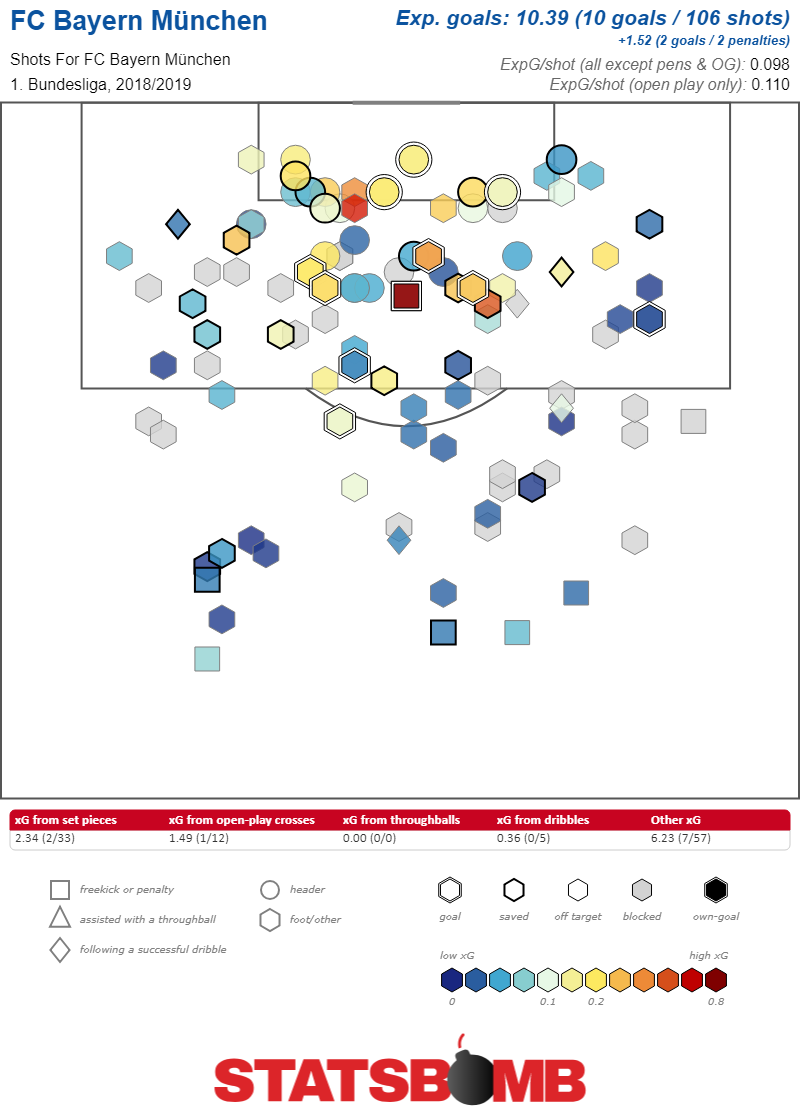 Part of the reason that they operate more like a blunderbuss than a scalpel in attack, is that it serves their defense incredibly well. While it might be fair to categorize Bayern’s attack as good enough, instead of absolutely great, their defense is truly on another level. They are conceding 0.53 expected goals per match. Wolfsburg, at 0.86, is the only other team in the Bundesliga conceding less than 1.10. In other words, sixteen teams in the Bundesliga concede at least twice as many goals per match as Bayern do. Bayern allow 6.83 shots per match. Borussia Dortmund, at 9.50, is the only other team in the league that allows fewer than 11. The team has conceded three non-penalty goals from 41 shots. That’s the list.
Part of the reason that they operate more like a blunderbuss than a scalpel in attack, is that it serves their defense incredibly well. While it might be fair to categorize Bayern’s attack as good enough, instead of absolutely great, their defense is truly on another level. They are conceding 0.53 expected goals per match. Wolfsburg, at 0.86, is the only other team in the Bundesliga conceding less than 1.10. In other words, sixteen teams in the Bundesliga concede at least twice as many goals per match as Bayern do. Bayern allow 6.83 shots per match. Borussia Dortmund, at 9.50, is the only other team in the league that allows fewer than 11. The team has conceded three non-penalty goals from 41 shots. That’s the list. 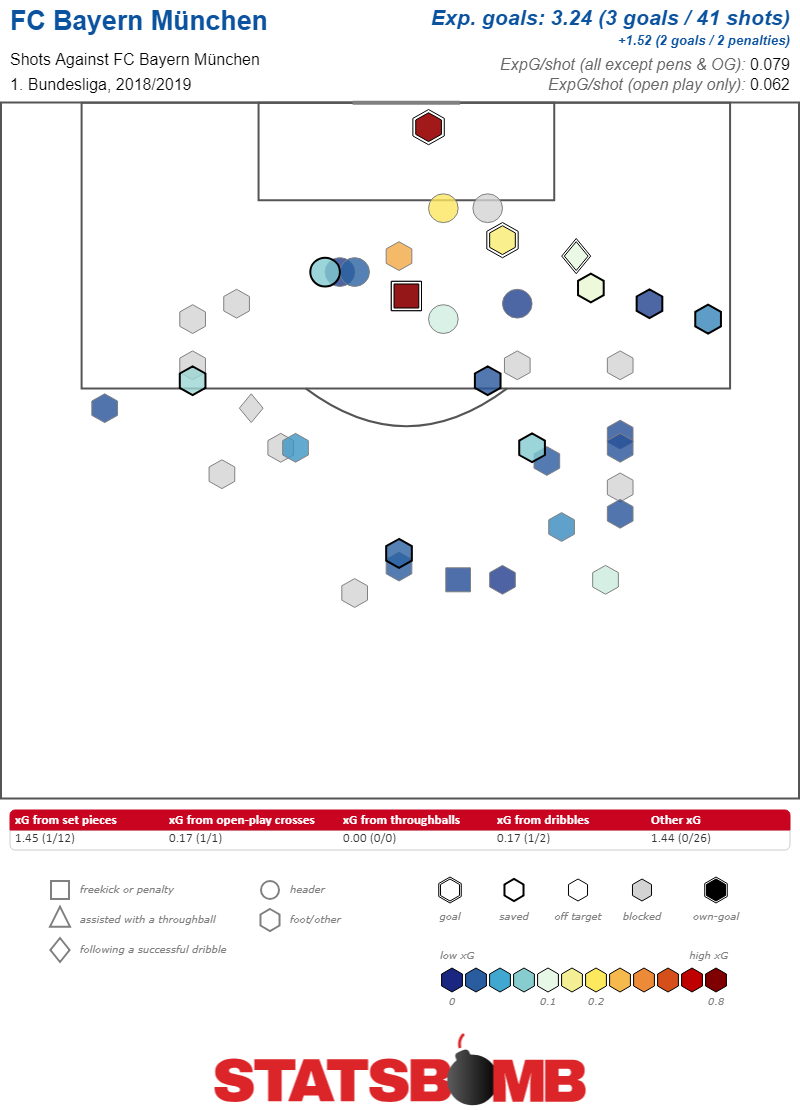 Put the very good attack together with that otherworldly defense and the full picture is a Bayern side that’s just a lot better than everybody else, in ways that will almost certainly become apparent over the course of the season. Despite the table at the moment, the underlying numbers aren’t particularly close.
Put the very good attack together with that otherworldly defense and the full picture is a Bayern side that’s just a lot better than everybody else, in ways that will almost certainly become apparent over the course of the season. Despite the table at the moment, the underlying numbers aren’t particularly close. 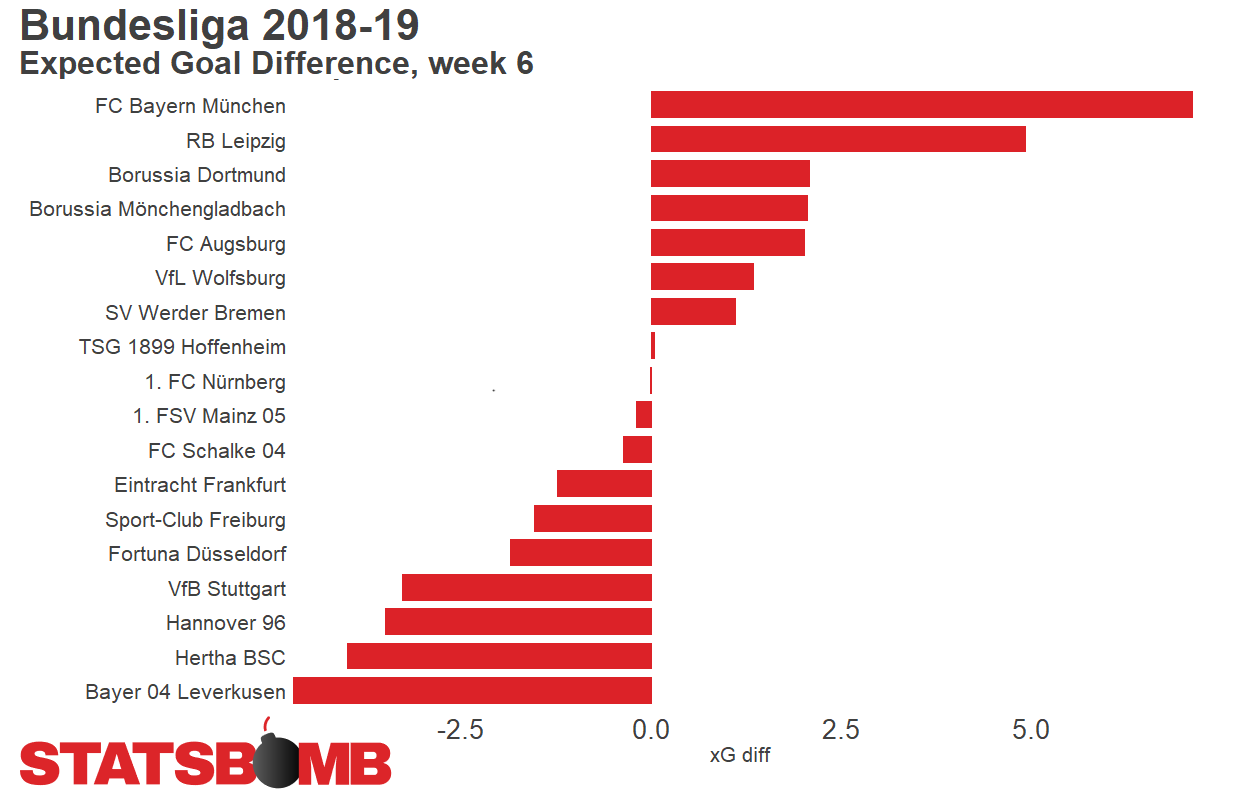 There’s not a lot in Bayern’s individual disappointing results that raises alarm bells either. The draw against Augsburg was the result of a late defensive lapse, the kind of thing which might start to draw concern if it happened repeatedly, but given Bayern’s overall numbers seems like a one-off. Occasionally even the best defensive team will trip over their own feet.
There’s not a lot in Bayern’s individual disappointing results that raises alarm bells either. The draw against Augsburg was the result of a late defensive lapse, the kind of thing which might start to draw concern if it happened repeatedly, but given Bayern’s overall numbers seems like a one-off. Occasionally even the best defensive team will trip over their own feet. 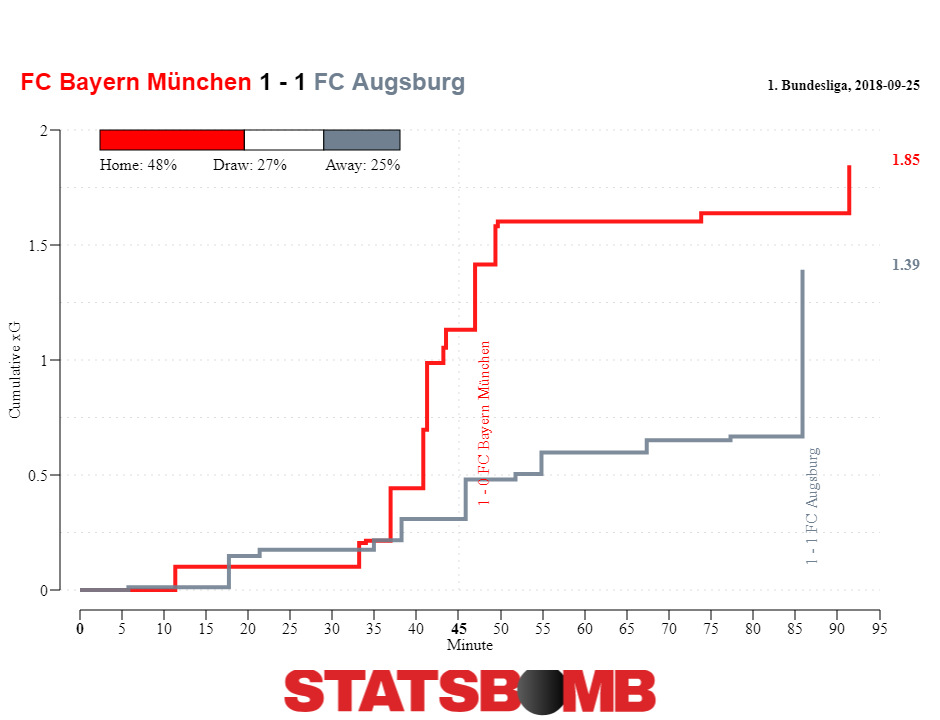 The Hertha match was even more shocking, and even less concerning. Yes Bayern conceded an early penalty, and then a second from a cross just before halftime. They also piled on the pressure in the second half to an absurd degree, and just couldn’t quite overcome the wounds. Hertha had two goals from six total shots. They managed just two shots after halftime, one in the 94th minute. Bayern meanwhile poured it on, creating three really good chances, and approximately infinite marginal ones. The shot total was 24-6 by the end of the match, and the expected goals were 1.75-1.19. Sometimes stuff happens.
The Hertha match was even more shocking, and even less concerning. Yes Bayern conceded an early penalty, and then a second from a cross just before halftime. They also piled on the pressure in the second half to an absurd degree, and just couldn’t quite overcome the wounds. Hertha had two goals from six total shots. They managed just two shots after halftime, one in the 94th minute. Bayern meanwhile poured it on, creating three really good chances, and approximately infinite marginal ones. The shot total was 24-6 by the end of the match, and the expected goals were 1.75-1.19. Sometimes stuff happens. 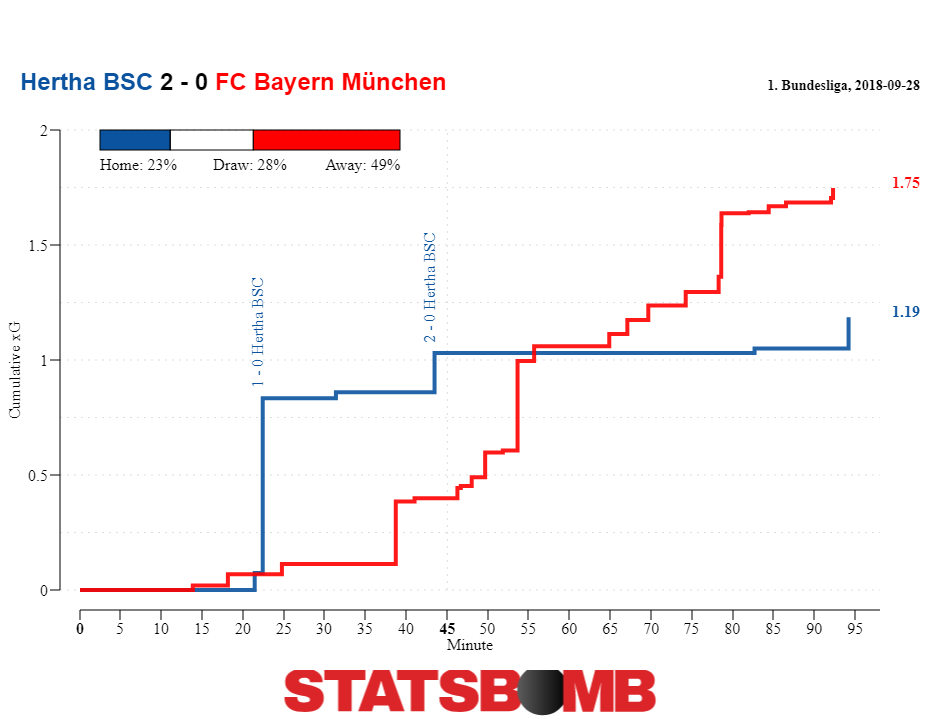 Ultimately there’s just no reason to worry about Bayern right. Their numbers are great, clearly the best in the league, their results will follow. In fact, the bigger worry for the Bundesliga is that Bayern might be too good. If the expectation is that Bayern are so good that every game is a must win, that’s a reflection on the current state of the rest of the league. Sometimes stuff happens. A random penalty, a defensive lapse, those are supposed to be normal occurrences. Good teams sometimes lose. If the Bundesliga has become so stratified that Bayern shouldn’t lose, even when everything goes wrong, that’s a sign of an unhealthy league. Bayern are going to be fine. They’re going to go back to winning games and smothering teams, and absolutely strangling the life out of the rest of the Bundesliga. The real question is whether the Bundesliga will be fine as well. If Bayern is so dominant that dropping four points is a crisis, what does that say about everybody else? Header image courtesy of the Press Association
Ultimately there’s just no reason to worry about Bayern right. Their numbers are great, clearly the best in the league, their results will follow. In fact, the bigger worry for the Bundesliga is that Bayern might be too good. If the expectation is that Bayern are so good that every game is a must win, that’s a reflection on the current state of the rest of the league. Sometimes stuff happens. A random penalty, a defensive lapse, those are supposed to be normal occurrences. Good teams sometimes lose. If the Bundesliga has become so stratified that Bayern shouldn’t lose, even when everything goes wrong, that’s a sign of an unhealthy league. Bayern are going to be fine. They’re going to go back to winning games and smothering teams, and absolutely strangling the life out of the rest of the Bundesliga. The real question is whether the Bundesliga will be fine as well. If Bayern is so dominant that dropping four points is a crisis, what does that say about everybody else? Header image courtesy of the Press Association
2018
Bayern Are Fine, but the Bundesliga May Not Be
By Kevin Lawson
|
October 3, 2018
